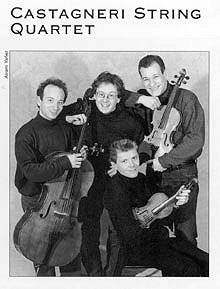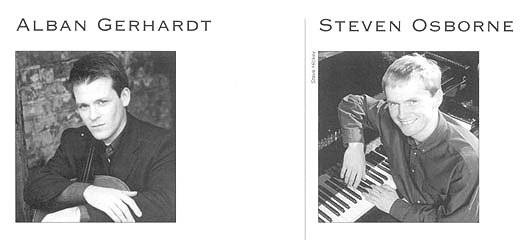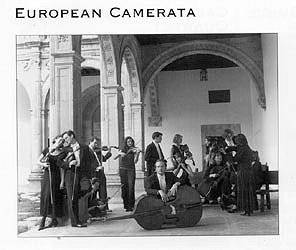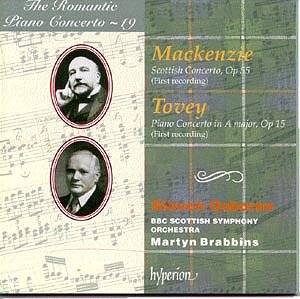For its first concert in the new century, the Wigmore Hall paraded a showcase of mainly younger musicians in a long afternoon and evening miscellany, which had no discernible overall pattern. It veered between seasonal fun and profundity, with juxtapositions which sometimes jarred. But along the way, there was some marvellous music making.
Philip Moore & Simon Crawford-Phillips were the first two of four pianists to take the stage; that always offers illuminating comparisons for pianist fanciers. They have established a piano duet partnership (one piano) and have trawled the rich repertoire for this staple home music medium of Victorian times and before, exemplified by Schubert's extensive list of piano duets, many still little known [complete recording by Goldstone & Clemmow Olympia OCD671 etc, recommended: Click on links for details OCD671 OCD672 OCD674 OCD648 TROY248 ]. For the New Year, Moore & Crawford-Phillips settled us comfortably for the long journey ahead with Bizet's Jeux d'enfants, twelve charming pieces which demand pianistic skill of a high order to make their best effect. They were played with pellucid tone, uncongested texture and the effortless unanimity which is easier to achieve sitting side by side, once feet and hands have been sorted out together.

We were next jerked into the concentrated mood and prodigious originality
of the young Britten's Phantasy Quartet Op 2 (1932) given as finely
considered and achieved a performance as ever I heard by Francois Leleux
with members of the Castagneri String Quartet. The quartet repeated
their prize-winning performance of the Debussy Quartet, remembered from their
participation in the 1997 London String Quartet Competition and honed to
ever more subtle perfection.
The opportunity to maintain French continuity with Poulenc until the supper break was dashed by the inappropriate interposition of a group of English and German songs given by a seasonally afflicted Christopher Maltman. It was nice to hear John Ireland's once so popular Sea Fever again, and too a wistful Joyce setting, but these were placed within a group of hearty songs. Those struck quite the wrong note, and made an unconvincing case for this now neglected composer, despite special pleading by Gerald Larner in the programme notes. Nor was I persuaded that the Brahms Op 91 songs gain as much as they lose in performance by baritone with cello obbligato, instead of the usual, magical combination of mezzo and viola.
We descended into further depression with Poulenc's valedictory oboe sonata, his sad last work that starts with an Elegie and finishes with a desolate Deploration. This was played by the balletic Francois Leleux, who swoops around the stage choreographing every phrase, and accompanied by Philip Moore, swaying at the keyboard in sympathy. Expressive performance gesture quickly becomes caricature and this duo might do well to video themselves at rehearsal; their episode in the concert had my thoughts turning to an after dinner shipboard musicale over a heavy swell!

In the nick of time, Steven Osborne brought the proceedings up to the long interval with an exemplary solo group. He plainly took it that he had been invited to a party, and dashed off three Poulenc miniatures with style, and the best focused piano sound of the whole evening, sitting still but alert to every nuance and to how his playing sounded in this particular hall. He added a small group of improvisations and arrangements, which he introduced disarmingly, risking a whisky for the quickest listener to recognise the first few notes of Joplin's The Entertainer. It was a pleasure to hear live a great young pianist whom I had admired for his championship of Sir Donald Francis Tovey's wonderful Piano Concerto.
To complete the evening after supper, Alan Gerhardt gave a vibrant,
intense account of Kodaly's solo Cello Sonata Op 8, which should be heard
far more frequently as a change from the Bach suites, which dominate that
specialised repertoire disproportionately. Sitting in the middle of the stage
alone, he filled the hall with sound, and
 provided
thereby a foil for the concert's finale, the appearance of European
Camerata, 15 graduate string players from the European Union Youth Orchestra.
Standing to deliver, led by Laurent Quenelle (violin), they gave an inspiring
performance of the Tchaikovsky Serenade for Strings (a work to which
routine is death!) which will live in the memory for a long time.
provided
thereby a foil for the concert's finale, the appearance of European
Camerata, 15 graduate string players from the European Union Youth Orchestra.
Standing to deliver, led by Laurent Quenelle (violin), they gave an inspiring
performance of the Tchaikovsky Serenade for Strings (a work to which
routine is death!) which will live in the memory for a long time.
This concert brought a lively, mixed audience to hear artists of the future and to celebrate the Wigmore Hall, which opened originally in 1901, now frequently attracts capacity audiences (retaining the loyalty of artists who can easily fill larger venues) and is well set to maintain its central place in London's musical life during the 21st Century.
Peter Grahame Woolf

Steven Osborne's justly acclaimed CD of Scottish piano concertos is released by Hyperion CDA67023 * * * *, with Mackenzie Scottish Concerto].
He plays Messiaen's Vingt regards at Wigmore Hall 5 January.
Alban Gerhardt will be giving the BBC lunchtime concert from the Wigmore Hall on 14 February. PGW
 Return to:
Return to: